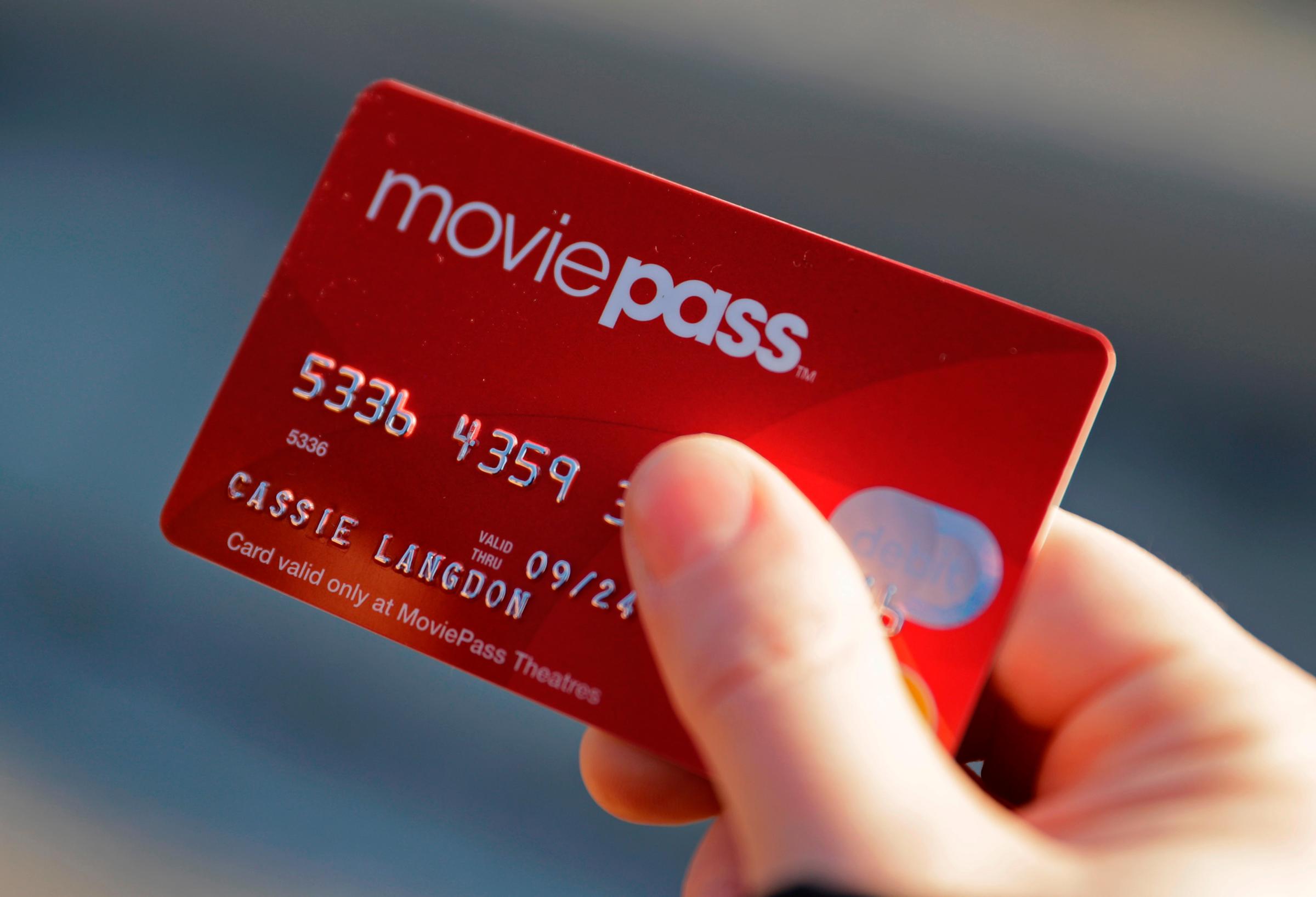
MoviePass is back. In April, co-founder Stacy Spikes spoke to TIME about his intentions to relaunch the popular moviegoing subscription service. Now Spikes has announced MoviePass’ official return date: September 5.
The company hopes to drive audiences to theaters during a particularly desperate moment for theaters. No major blockbusters have been released in the last several weeks and none are planned to hit cinemas until the end of October. Spikes argues that MoviePass can help fill seats during this slow period and build momentum ahead of Oscar season.
“We believe now is the best time to relaunch,” Spikes told TIME this week. “Studios and theaters are open to experimenting with new ideas. There’s a strong slate of films coming and we’re very excited to help get cinema back on her feet.”
MoviePass, which at one point was responsible for buying about 6% of all movie tickets sold, remains popular, at least in concept. In an email, Spikes announced a prelaunch waitlist that would allow those who signed up to join the service on Labor Day. About 30,000 people registered within five minutes of the announcement, crashing the MoviePass website, according to Spikes.
In its previous iteration, MoviePass allowed users to see a movie per day for a flat monthly fee, which, at its lowest point, dropped to $10 in 2017. If that deal sounds too good to be true, it was. Spikes says he questioned the wisdom of keeping this promotion running beyond a few days, but a data-analytics firm had purchased a majority stake in the company and didn’t heed his advice. Spikes was ousted from MoviePass in 2018, and the parent company eventually filed for bankruptcy.
Spikes has since bought back the MoviePass name and will head up the new version of the company. Here’s what you need to know about how MoviePass will work.
When will MoviePass relaunch?
The beta version of the service will relaunch on September 5, Labor Day. The waitlist to join opened on August 25 and is already closed.
Users on the waitlist will be able to invite 10 friends once they sign up for the service. For now, only those on the waitlist or those invited to the beta by a friend will be able to road test MoviePass. The company has not yet said when it will expand beyond beta testing.
More from TIME
How much will it cost?
You can choose between plans that will cost $10 per month, $20 per month, or $30 per month. For context, the average movie ticket price was $9.16 in 2019, according to the National Association of Theatre Owners, which has not updated that statistic since the pandemic.
How will the new MoviePass work?
Depending on what price point you choose, you receive a set number of credits that you can spend on different movie showings. Attending a prime-time screening, say, on a Friday night, will cost you more credits than attending a screening of the same movie on a Tuesday. (Chains like AMC and Regal employ a similar model, charging less on weekdays than weekends.)
Read More: The 52 Most Anticipated Movies of Fall 2022
Bigger films like Black Panther: Wakanda Forever will cost more credits than smaller, less in-demand indies. It’s unclear how many movies, on average, a subscriber will be able to see in a given month. But Reddit is sure to be filled with tips on how to get the most bang for your buck—er, credits.
MoviePass will still work across all the major movie theater chains as well as many smaller ones, and MoviePass has partnered with MasterCard to create a debit card for users. Subscribers will be able to order movie tickets through the app or use the debit card at the theater.
MoviePass will buy movie tickets straight from theaters and distribute them to its users. They don’t need the major movie chains’ permission to do so. But Spikes hopes to strike deals with movie-theater chains to buy tickets at a discounted price and help them fill otherwise-empty seats on slower days—seats that also translate to popcorn sales for the theater.
Spikes says he has already partnered with about 25% of movie-theater chains, but that does not include the three biggest in the U.S.: AMC, Regal, and Cinemark. Spikes has set an ambitious goal for MoviePass to be responsible for 30% of all movie-ticket sales across the U.S. by 2030.
Why did MoviePass shut down in the first place?

The rise and fall of MoviePass is a long and fraught story. After years of trying and failing to pitch MoviePass to investors, Spikes and his co-founder Hamet Watt sold a majority stake to a data-analytics firm called Helios and Matheson. According to Spikes, Helios and Matheson decided to launch a promotion—unlimited movies for just $10 per month. Sign-ups shot up from 20,000 to 100,000 within 48 hours.
Read More: The Best Movies of 2022 So Far
What was supposed to be a limited-time offer turned into a long-term business plan, with which Spikes disagreed. In 2018, Spikes was told his services were no longer needed. In less than a year, MoviePass surpassed 3 million subscribers. But too many users were seeing too many movies, and the company began to bleed money
In 2020, Helios and Matheson declared bankruptcy and MoviePass was no more. The next year, the Federal Trade Commission accused Helios and Matheson of deceiving customers and invalidating passwords so customers couldn’t buy as many tickets. (Helios and Matheson settled with the FTC last year.) Spikes bought back the name in 2021 and began working on a relaunch plan.
Who is MoviePass’ competition?
Since MoviePass’ demise, several theater chains have launched their own MoviePass-like services. Regal offers the closest thing to what made MoviePass loyalists fall in love with subscriptions in the first place: unlimited screenings for $18 per month. Alamo Drafthouse Season Pass sells for about $20 to $30 per month, depending on location, with a limit of one movie per day.
Other services set a stricter limit on how many movies you can see. AMC Stubs A-List program charges at least $20 a month for up to three movies a week. The theater chain says it has about 1 million members in the program. Cinemark also has about 1 million members for its plan, which charges $10 to see one movie per month. Most of these programs also offer discounts on concessions.
What is the state of movie theaters right now?
Grim. The theaters that were open during the last couple of years saw terrible box-office returns when studios diverted many of their movies to streaming services and customers got used to watching new films on their couches. Early this summer, movie houses were finally seeing an upturn in attendance. Top Gun: Maverick managed to surpass Titanic to become the highest grossing film in domestic box-office history. The Gentleminions phenomenon on TikTok helped drive teens to theaters for the new Minions movies.
But since July, the box office has faltered. No major films have hit theaters in the last several weeks thanks to COVID-19-related delays and studio calendar reshuffling. That drought likely won’t end until late October when horror flick Halloween Ends and Dwayne Johnson’s superhero movie Black Adam hit theaters. Film prognosticator Matthew Belloni recently suggested that Hollywood may go two months without generating a $25 million opening weekend. Overall, the summer box office is down 25% from 2019.
Cineworld, which owns the nation’s largest movie chain Regal Cinemas, cited this slowdown when it announced on August 22 that the company was considering filing Chapter 11 bankruptcy. Theaters are so desperate to lure customers right now that they’re offering movie tickets for just $3 during newly launched National Cinema Day.
Black Panther: Wakanda Forever and Avatar: The Way of the Water are scheduled to hit theaters during the holiday season and could give the box office a much-needed boost. But in the meantime, MoviePass could play a role in boosting the box office. Historically, the subscription service made little impact on ticket sales for major blockbusters—people were going to see those movies anyway. But it did improve sales for documentaries, indies, and Oscar bait, the sorts of films that fill the calendar in the fall.
Whether MoviePass can prod moviegoers into seeing flicks like David O. Russell’s Amsterdam, Steven Spielberg’s The Fabelmans, or Olivia Wilde’s Don’t Worry Darling this autumn may help determine whether the box office can recover by the end of the year.
More Must-Reads from TIME
- Cybersecurity Experts Are Sounding the Alarm on DOGE
- Meet the 2025 Women of the Year
- The Harsh Truth About Disability Inclusion
- Why Do More Young Adults Have Cancer?
- Colman Domingo Leads With Radical Love
- How to Get Better at Doing Things Alone
- Michelle Zauner Stares Down the Darkness
Write to Eliana Dockterman at eliana.dockterman@time.com